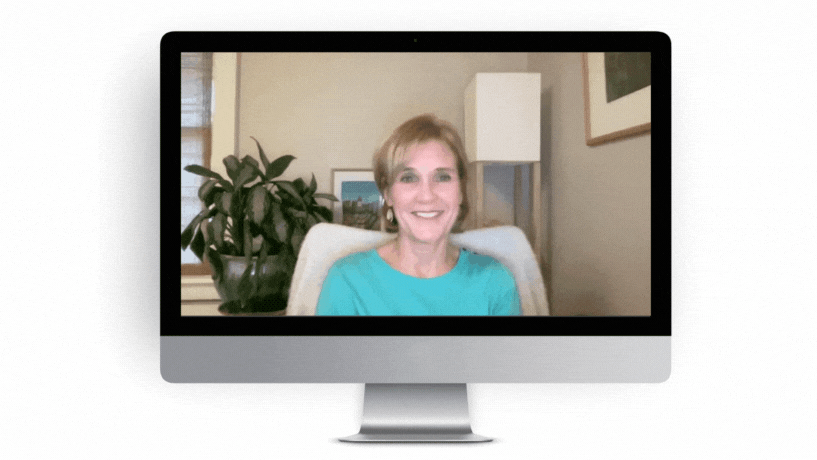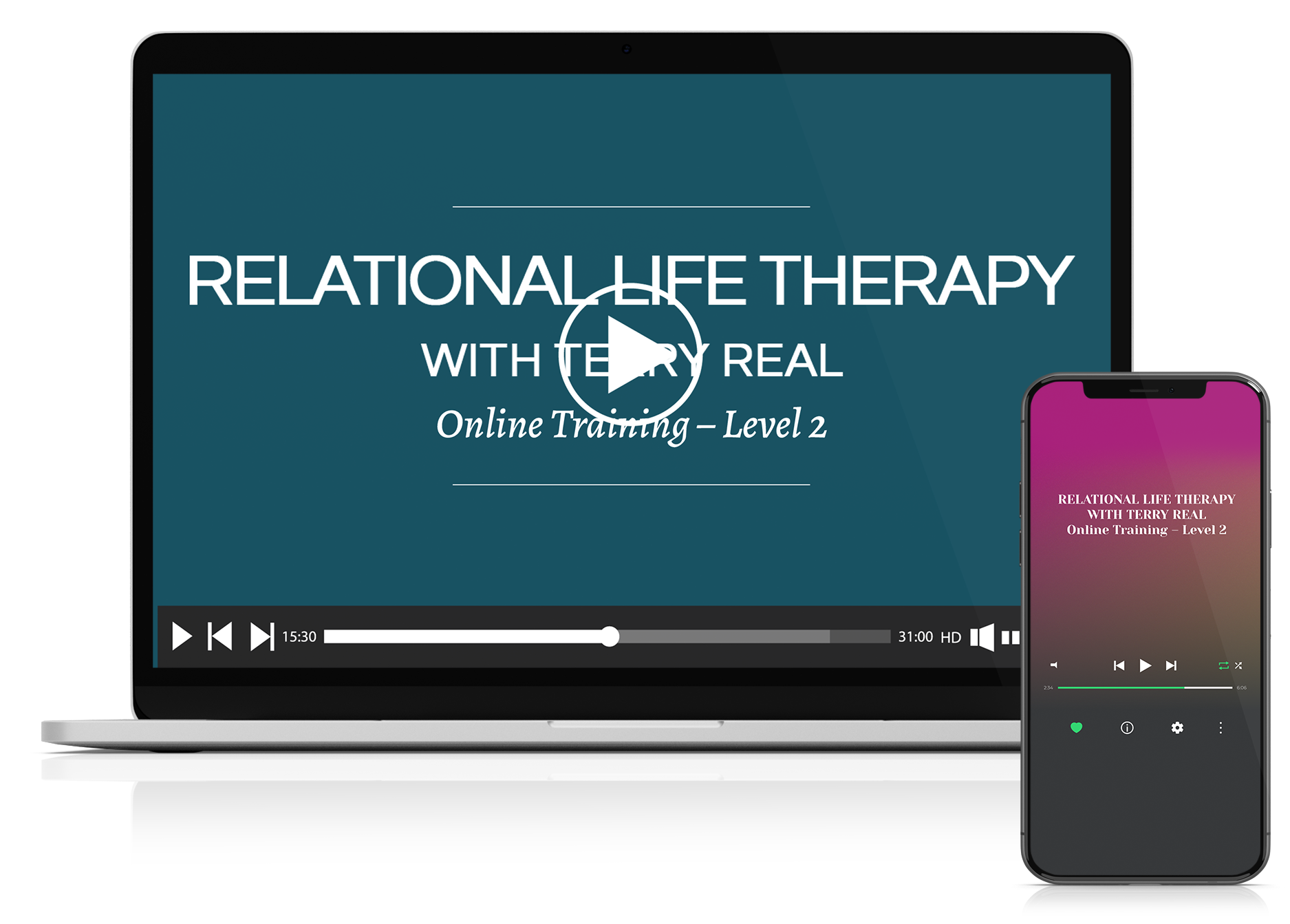
RLT Level 2 – Online Training
Learn how to conduct powerful inner child work in the couples context to heal relational trauma and build empathy between partners.

An 11-hour training including real-time couples therapy demonstrations and previously recorded 90-minute Q&A calls.
“Family dysfunction rolls down from generation to generation, like a fire in the woods, taking down everything in its path until one person in one generation has the courage to turn and face the flames. That person brings peace to their ancestors and spares the children that follow.”
– Terry Real

Welcome Back!
Thank you for joining me for RLT Level 1—I hope the diagnostic lenses have already proved useful in your sessions.
I now invite you to explore the next phase of RLT: deep trauma work. This is where we deepen our understanding of each partner’s relational stance as we uncover how it developed before conducting the powerful inner child work to heal relational trauma.
We’ll explore multi-generational legacies, and the roadmap for conducting inner child work in the presence of the partner to build empathy and intimacy.
And you’ll learn to work with resistance, including how to reiterate leverage and detach from outcome. We’ll wrap things up with an exploration of attachment styles and how to work with them in therapy.
I’m thrilled to invite you to 3 brand new 90-minute Q&A calls with esteemed RLI faculty member Bonny Slim, LMFT. Bonny will guide you through a deeper exploration of RLT Phase 2 as she takes your questions on the course material. This is an excellent way to cement your learning and clarify any gaps you may have.
I hope you’ll join us.
Warmly,
Terry
What’s included in RLT Level 2:
5 Core Modules with Terry Real
Unlock instant access to 6.5 hours of video trainings from the creator of Relational Life Therapy take you deep into the nuances of RLT Phase 2 and the practical tools you need to confidently conduct trauma work in the couples context.


Pre-Recorded Q&A Call with Senior RLT Therapist, Bonny Slim, answering many of your questions.
Bonus Handouts to Support Your Client Sessions
Download useful handouts to use in your sessions, including Terry Real’s roadmap for inner child work and the Trauma Grid.

For Level 2 CE Information please go here.
Here’s what you’ll learn:
Module 1:
REVIEWING BLATANTS AND LATENTS: DIAGNOSING & REPAIRING POWER IMBALANCES
We therapists and coaches often find a power imbalance in many troubled relationships in which one person is on top while the other feels “less than.” Many couples come to us when one partner exerts more power and the other doesn’t feel seen or heard. We help address the fears of the disempowered partner and empower them to stand up to their overbearing partner. In this module, we will look at the skills needed for redressing power imbalances and how to implement them.
We will discuss:
When to use positive and negative leverage.
Joining through, as opposed to clobbering someone with, the truth.
Using family of origin work to rebalance the relationship.
Module 2:
Moving from the Present to Each Partner’s Family of Origin
Multi-generational legacies—the son of a rager becomes a rager, the daughter of a rager
becomes a rager, the nonbinary child partners with the rager—go on and on until someone stops them. In this module, you will learn how to silhouette a couple’s present difficulties, their choreography, against the backdrop of multi-generational legacy. Terry builds on the work of Pia Mellody to illustrate how legacies are transmitted through trauma, through intrusive or abandoning injury. If we are to help partners move into increased intimacy, we must surface and deal with each of their family’s legacies.
Moving from the present into the past by using the “affect bridge” (when have you felt these feelings before?)
Transitioning to Family of Origin by using the 3 questions:
- Who did you see do this?
- Who did it to you?
- Who did you do it to and no one stopped you?
How to frame current difficulties as the opportunity to transform one’s legacy and hand over a different future to one’s children
Module 3:
Working with Deep Trauma in the Presence of One Another
All trauma is relational trauma. In RLT, we work to heal a person’s trauma in the presence of their partner because it can deepen and accelerate healing for them both. We will examine how multigenerational trauma plays a role in adult relationships and how to best work with both inner child states—Wounded and Adaptive.
We will discuss:
4 types of trauma and where they fall on the Trauma Grid.
How the Adaptive Child is formed.
Reparenting the Adaptive and Wounded Child parts.
Module 4:
Dealing with Resistance and Amplifying Progress: The Difference Between Gratification and Relational Joy
When we work with a resistant client, it’s important to hone our skills in how best to use feedback, reiterate leverage, and detach ourselves from specific outcomes. But first, we must determine where the client’s resistance is coming from. Does it come from a fear of showing vulnerability? Or perhaps past trauma is holding someone back. Knowing how to use oneself and presence therapeutically, we can allow our clients to borrow our prefrontal cortex and enlist the Wise Adult part of the client to act as a mentor and teacher to themselves.
We will discuss:
The five fears behind resistance and how to respond to them.
Understanding and befriending the resistant part.
Using positive and negative leverage with a resistant part.
Module 5:
LOOKING AT ATTACHMENT STYLES: LOVE DEPENDENT AND LOVE AVOIDANT—WHAT TO DO
Type 1 Love Avoidants are people who grew up in avoidant families and learned, from a very young age, that a lack of emotional connection is normal. As adults, Type 1 Avoidants often find emotional connection oppressive. We teach the Love Avoidant intimacy skills and how to open up his or her heart.
By contrast, a Type 2 Love Avoidant has experienced trauma, specifically enmeshment as a scapegoat, caretaker, hero, or confidant. These folks find closeness suffocating and Type 2 Love Avoidants need experiential trauma work to deal with their enmeshment. We’ll look at the differences between these two types of Love Avoidants and how to best approach each in the therapy room.
If the wound for Type 2 Love Avoidants is enmeshment, the wound for virtually all Love Dependents is abandonment. The sense of being abandoned is an early childhood trauma state. Adults don’t get abandoned, they get left. Abandoned means, “Without you I die,” and that’s exactly how it feels inside. In this module, you will learn to teach Love Dependents how to “Remember Abundance,” and how to reappropriate the sense of vitality and richness that they are used to projecting on others for themselves.
We will discuss:
How to sell the value of intimacy along with its skills to a Type 1 Love Avoidant.
How to teach negotiation and the assertion of needs along with appropriate trauma work when dealing with a Type 2 Love Avoidant.
How to work on self-esteem, boundaries, and the remembrance of abundance when working with Love Dependents.
“Terry Real helps overturn old-fashioned, confining roles and opens up a treasury of hope for lasting and exciting intimacy for couples everywhere.”
— Edward Hallowell, M.D., author of Crazy Busy
“Before RLT I felt like something was missing as a therapist. The things I was taught in school were not practical and I felt stuck in my practice. I’m so grateful for the experiences I have had with the RLT training. I now see relationships in a way that finally makes sense to me and I have more confidence working with couples because I have something that is realistic and I believe works and more importantly my clients are able to grasp and practice.”
— Jen K
“Terry’s work provided foundations of “telling the truth” to clients. I did it easily with individuals, but stumbled with couples. Now I LOVE working with couples. It is now always profoundly moving & instructive.”
— Jeanne O
“After 25 years of working as a Psychotherapist and Marriage Counselor I was ready to “hang it all up.” I was more than burnt out. Now, 6 months later, I am reinvested in my work and enjoying it in a brand new way. Renewed energy and enthusiasm for my work has replaced the negativity I was experiencing. Thanks so much RLT!”
— Jeanne O
Here’s Everything in the
RLT Level 2 Online Training:
🎥 5 Core Modules with Terry Real
6.5 hours of pre-recorded video trainings from the creator of Relational Life Therapy.
📅 3 Recorded 90-minute Q&A Calls with Senior RLT Therapist, Bonny Slim
📄 Bonus Handouts to Support Your Client Sessions
Download useful handouts to use in your sessions, including Terry Real’s roadmap for inner child work.
Get Started With RLT Level 2 Today
Choose the single payment option or payment plan:
Pay Once
$497
Pay in 3 Installments
NOW 3 Easy Payments of
$187
Did you know...
This course is part of the RLT Certification program—our deepest training in the RLT model.
Your 100% Money-Back Guarantee
We’re confident you’ll be happy with the Relational Life Therapy Level 2 Training. However, if you are not 100% satisfied with your purchase, simply contact us at support@terryreal.com within 14 days of your purchase and we’ll give you a full refund, no questions asked.
Frequently Asked Questions
When are the live Q&A calls?
The calls are no longer live. You will have access to listen to and review these Q&A sessions in the course.
Are CEs available?
Currently we are not offering CEs for this course.
Is it RLT Level 2 live or self-paced study?
There are two components of RLT Level 2:
- 6.5 hours of self-paced video training with Terry Real
- 3 pre-recorded 90-minute Q&A calls with Bonny Slim from the RLI Faculty
How long will I have access to RLT Level 2?
Forever! All course materials, including the call recordings, will be stored in your private learning platform (the RLT Hub) for you to review at your convenience.
Is RLT Level 2 part of the RLT Certification program?
Yes—when you enroll in the RLT Certification (our deepest, richest training in the RLT model), you automatically receive access to RLT Level 1. If you’d like to learn more about the RLT Certification please visit the information page here.
Learn how to conduct powerful inner child work in the couples context to heal relational trauma and build empathy between partners.




